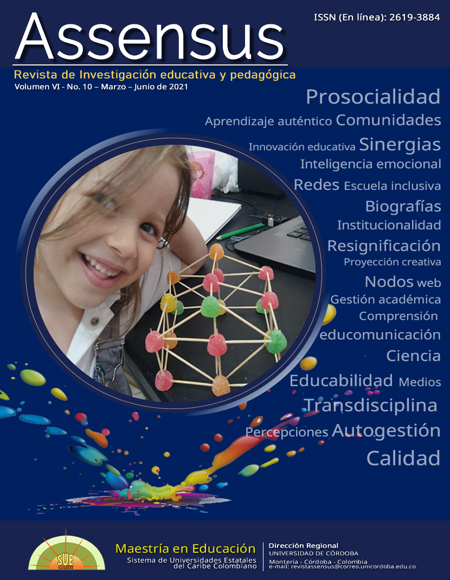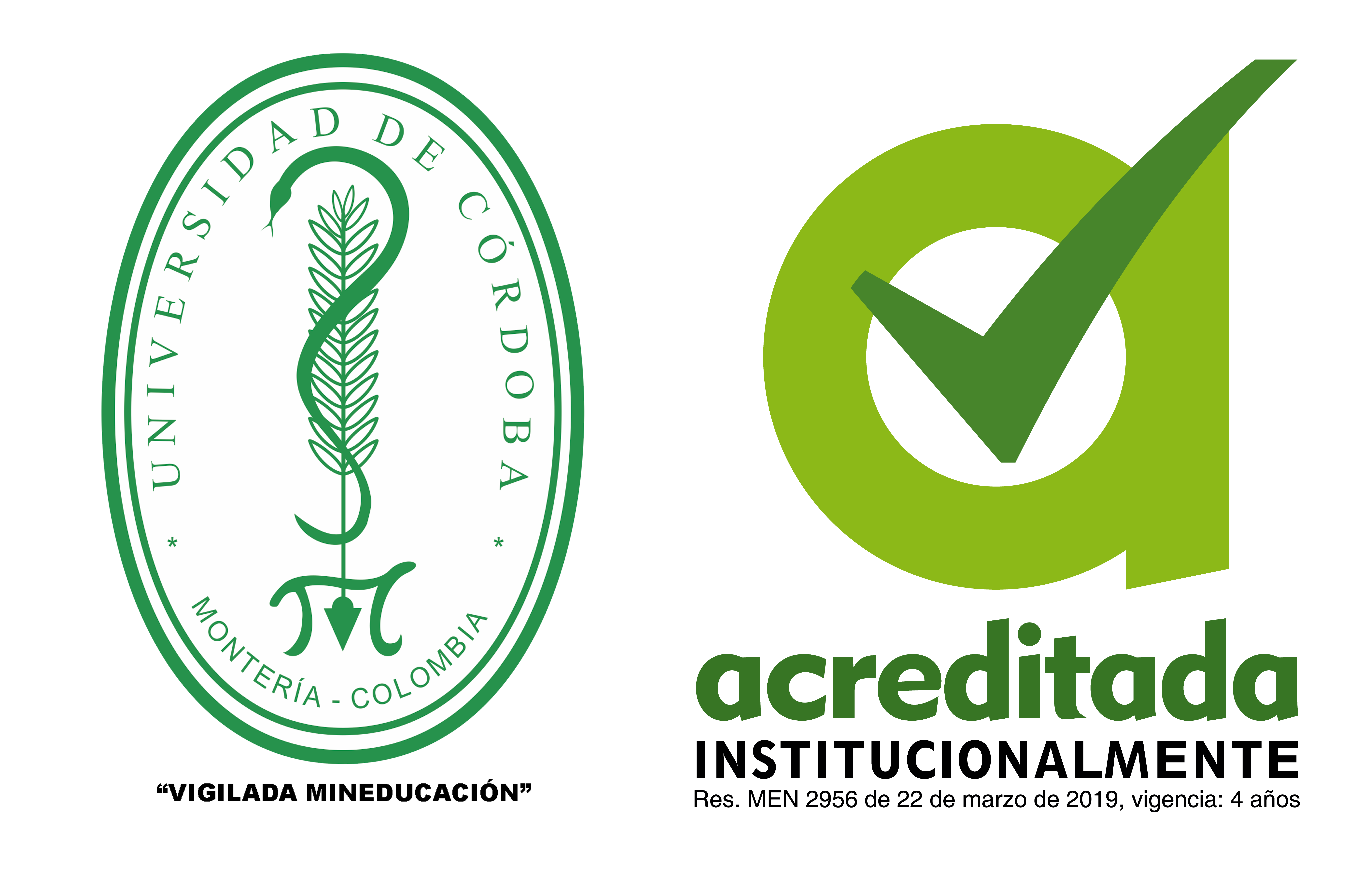Collaborative learning mediated by a leadership environment, in the development of the Random Thinking
Aprendizaje colaborativo mediado por un ambiente de liderazgo, en el desarrollo del Pensamiento Aleatorio
The Assensus journal has a Creative Commons license. The citation, use and partial or total reproduction of the contents is authorized by citing sources. For more information, see https://creativecommons.org/licenses/by-sa/4.0/deed.en
Show authors biography
This study shows the influence of collaborative learning mediated by a leadership environment in the development of random thinking with tenth-grade students from an official educational institution in the department of Córdoba (Colombia). The problem revolved around the difficulties presented by the teaching-learning processes of random thinking and which are reflected in the results obtained by the students in internal and external tests. The quantitative research, under a quasi-experimental design, included two tests: one to determine leadership conditions in the experimental group and another to assess the level of development of random thinking, before and after the intervention. The results obtained were corroborated with the application of two non-parametric tests: Mann-Whitney U and Wilcoxon available in the free version 25 SPSS software. It should be noted that the students belonging to the experimental group achieved significant improvements in the development of random thinking, after being intervened with the collaborative learning strategy. Additionally, in this group, no significant differences were found regarding the development of competencies: interpretation and representation, and argumentation. However, the increase in the average ranges of their performance was noticeable, allowing to conclude the effectiveness that the application of the collaborative learning strategy favors in the development of random thinking in the students of the educational institution under study.
Article visits 873 | PDF visits
Downloads
- Abrahamson, D., & Wilensky, U. (2004). SAMPLER: Collaborative Interactive Computer-Based Statistics Learning Environment. Proceedings of the 10th. https://edrl.berkeley.edu/wp-content/uploads/2019/09/SAMPLER-Collaborative-interactive-computer-based-statistics-learning-environment.pdf
- Abrahamson, D., & Wilensky, U. (2007). Learning axes and bridging tools in a technology-based design for statistics. Springer Science+Business Media B.V, 12(1), 23–55. https://doi.org/10.1007/s10758-007-9110-6
- Abrahamson, D., & Wilensky, U. (2005). ProbLab goes to school: Design, teaching, and learning of probability with multi-agent interactive computer models. Fourth Conference of the the European Society for Research in Mathematics Education, 1–10. http://ccl.northwestern.edu/
- Alavi, M. (2020). Computer-Mediated Learning : An Empirical Evaluation. Management Information Systems Research Center, 18(2), 159–174. https://www.jstor.org/stable/249763
- Andreu, S. (2015). Una forma diferente de enseñar ciencias, a través del aprendizaje cooperativo en Primaria [Universidad Internacional de La Rioja]. https://reunir.unir.net/handle/123456789/3261
- Arreguín, L. E., Alfaro, J. A., & Ramírez, M. S. (2012). Desarrollo de competencias matemáticas en secundaria usando la técnica de aprendizaje orientado en proyectos. REICE: Revista Electrónica Iberoamericana Sobre Calidad, Eficacia y Cambio En Educación, 10(4), 264–284. http://www.rinace.net/reice/numeros/arts/vol10num4/art16.pdf
- Avello-Martínez, R., & Marín, V. I. (2016). The necessary training of teachers in collaborative learning. Profesorado, 20(3), 687–713.
- Cardenas, D., Ceballos, C., & Cohen, P. (2017). Collaborative learning in students of basic high school in Colombia. Revista Gestión, Competitividad e Innovación, 14. www.pca.edu.co/investigacion/revistas/index.php/gci/
- Cárdenas, J. (2016). MLIS - construcción de instrumento para medir el liderazgo en estudiantes de secundaria [Pontificia Universidad Católica del Perú]. http://tesis.pucp.edu.pe/repositorio/handle/20.500.12404/8463
- Chen, J., Wang, M., Kirschner, P. A., & Tsai, C. C. (2018). The Role of Collaboration, Computer Use, Learning Environments, and Supporting Strategies in CSCL: A Meta-Analysis. Review of Educational Research, 88(6), 799–843. https://doi.org/10.3102/0034654318791584
- Collazos, C., Guerrero, L., & Vergara, A. (2017). Aprendizaje Colaborativo Un cambio en el rol del profesor. Congreso de Educación Superior En Computación, Jornadas Chilenas de La Computación, p.1-10. http://www.academia.edu/download/41551142/Aprendizaje_Colaborativo_Un_cambio_en_el20160125-26126-ixow8k.pdf
- Díaz, A., & Uribe, J. (2016). Una resignificación en los procesos de enseñanza del lenguaje y las matemáticas a partir de la implementación del Programa Todos a Aprender (PTA). Assensus, 1(1), 42-58. https://doi.org/10.21897/assensus.1283
- Díaz, D., & Palomino, J. (2016). Estrategias metacognitivas para el desarrollo de competencias genéricas en la resolución de problemas matemáticos de tipo numérico variacional en estudiantes de grado noveno [Universidad De Córdoba]. https://www.edunexos.edu.co/T_grado_Unicordoba/06_COHORTE/DIAZ_D_PALOMINO_J.pdf
- Fuentes, N. M., Wilches, J. C., & Robles, J. R. (2015). Desarrollo de los niveles de razonamiento geométrico según el modelo de Van Hiele y su relación con los estilos de aprendizaje. Panorama, 9, 44–54.
- Goleman, D., Boyatzis, R., & McKee, A. (2002). El líder resonante crea más. El poder de la inteligencia emocional. Plaza & Janés Editores. www.nbs.com.gt
- Gorgônio, F. L., Vale, K. M., Natal, B., Silva, Y. K., & Silva, H. M. (2017). Grouping Students for Cooperative and Collaborative Learning: challenges and trends in virtual learning environments. Proceeding of World Engineering Education Conference, 2, 51–55. https://doi.org/10.14684/EDUNINE.1.Vol.2.2017.
- Guthrie, K. L., & Jenkins, D. M. (2018). The role of leadership educators : transforming learning. https://books.google.es/books?hl=es&lr=&id=yVdMDwAAQBAJ&oi=fnd&pg=PR15&dq=Guthrie,+K.+L.,+%26+Jenkins,+D.+M.+(2018).+The+role+of+leadership+educators:+Transforming+learning.+IAP.&ots=CUAEfxjW36&sig=iVAVAdTvGfBQn3JUQA69SwqRXks
- Hallinger, P., & Heck, R. (2014). Liderazgo colaborativo y mejora escolar: comprendiendo el impacto sobre la capacidad de la escuela y el aprendizaje de los estudiantes. REICE: Revista Electrónica Iberoamericana Sobre Calidad, Eficacia y Cambio En Educación, 12(4), 71–88. www.rinace.net/reice/
- Hargreaves, E. (2007). The validity of collaborative assessment for learning. Assessment in Education: Principles, Policy and Practice, 14(2), 185–199. https://doi.org/10.1080/09695940701478594
- Hernández, R., Fernández, C., & Baptista, M. del P. (2014). Metodología de la investigación (Sexta edic). McGRAW-HILL, Interamericana Editores, S.A. de C.V.
- Hertwig, R., Pleskac, T. J., & Pachur, T. (2020). Interpreting Uncertainty: A Brief History of Not Knowing. In Taming Uncertainty (p. 343). https://doi.org/10.7551/mitpress/11114.003.0026
- Hurme, T. R., & Järvelä, S. (2005). Students’ activity in computer-supported collaborative problem solving in mathematics. International Journal of Computers for Mathematical Learning, 10(1), 49–73. https://doi.org/10.1007/s10758-005-4579-3
- ICFES. (n.d.). Instituto Colombiano para la Evaluación de la Educación Icfes. Retrieved May 18, 2018, from https://www.icfes.gov.co/
- ICFES. (2016a). Resultados. http://www2.icfesinteractivo.gov.co/ReportesSaber359/consultaReporteEstablecimiento.jspx
- ICFES. (2016b). Saber 9°. Lineamientos para las aplicaciones muestral y censal 2016 (pp. 1–74). ICFES. https://es.scribd.com/document/327847999/Guia-3-Lineamientos-Para-Las-Aplicaciones-Muestral-y-Censal-2016-v3
- Johnson, D. W., Johnson, R. T., & Holubec, E. J. (1993). Circles of learning: Cooperation in the classroom.
- Johnson, D.W., Johnson, R.T. & Smith, K. . (1991). Active Learning: Cooperation in the College Classroom. In Edina (pp. 1–6).
- Johnson, R.T. & Johnson, D. W. (1986). Action Research: Cooperative Learning in the Science Classroom. Journal of Science and Children, 24(2), 31–32.
- Johnson, D. W., & Johnson, R. T. (1981). Effects of cooperative and individualistic learning experiences on interethnic interaction. Journal of Educational Psychology, 73(3), 444–449. https://doi.org/10.1037/0022-0663.73.3.444
- Johnson, D. W., Skon, L., & Johnson, R. (1980). Effects of Cooperative, Competitive, and Individualistic Conditions on Children’s Problem-solving Performance. American Educational Research Journal, 17(1), 83–93. https://doi.org/10.3102/00028312017001083
- Jones, G. A., Langrall, C. W., Thornton, C. A., & Mogill, A. T. (1999). Students’ probabilistic thinking in instruction. Journal for Research in Mathematics Education, 30(5), 487–519. https://doi.org/10.2307/749771
- Kruse, K. (2013). What Is Leadership? http://www.forbes.com/sites/kevinkruse/2013/04/09/what-is-leadership/
- Kuo, Y. C., Belland, B. R., & Kuo, Y. T. (2017). Learning through blogging: Students’ Perspectives in collaborative blog enhanced learning communities. Educational Technology and Society, 20(2), 37–50.
- Laal, M., & Laal, M. (2012). Collaborative learning: What is it? Procedia - Social and Behavioral Sciences, 31, 491–495. https://doi.org/10.1016/j.sbspro.2011.12.092
- Lahann, P., & Lambdin, D. V. (2020). Collaborative Learning in Mathematics Education. In Encyclopedia of Mathematics Education (pp. 94–95). Springer International Publishing. https://doi.org/10.1007/978-3-030-15789-0_23
- Lamprianou, I., & Lamprianou, T. A. (2003). The Probabilistic Thinking of Primary School Pupils in Cyprus: The Case of Tree Diagrams. International Group For The Psychology Of Mathematics Education, 3, 173–180. https://eric.ed.gov/?id=ED501002
- Leavy, A., Meletiou-Mavrotheris, M., & Paparistodemou, E. (2018). Statistics in Early Childhood and Primary Education. In A. Leavy, M. Meletiou-Mavrotheris, & E. Paparistodemou (Eds.), Early Mathematics Learning and Development. Springer. https://doi.org/10.1007/978-981-13-1044-7
- Mellado, M. E., & Chaucono, J. C. (2015). Liderazgo pedagógico para reestructurar creencias docentes y mejorar prácticas de aula en contexto mapuche. Revista Electrónica Educare, 20(1), 371–388. https://doi.org/10.15359/ree.20-1.18
- MEN. (2006). Estándares Básicos de Competencias (Primera ed). Ministerio de Educación Nacional. https://www.mineducacion.gov.co/1621/articles-340021_recurso_1.pdf
- MEN. (2017). Matemáticas 10. Ministerio de Educación Nacional.
- Nacarato, A. M., & Grando, R. C. (2014). The role of language in building probabilistic thinking. Statistics Education Research Journal, 13(2), 93–103. http://iase-web.org/Publications.php?p=SERJ
- Nikiforidou, Z. (2018). Probabilistic Thinking and Young Children: Theory and Pedagogy (pp. 21–34). Springer, Singapore. https://doi.org/10.1007/978-981-13-1044-7_2
- Oates, G., Paterson, J., Reilly, I., & Woods, G. (2016). Seeing Things From Others’ Points of View: Collaboration in Undergraduate Mathematics. PRIMUS, 26(3), 206–228. https://doi.org/10.1080/10511970.2015.1094683
- OECD. (2015). Programa Internacional de Evaluación de los Alumnos (PISA). https://www.oecd.org/centrodemexico/medios/programainternacionaldeevaluaciondelosalumnospisa.htm
- Ortiz, L. (2015). Proyectos Colaborativos para el desarrollo del pensamiento numérico en básica primaria [Universidad EAFIT Escuela]. http://repository.eafit.edu.co/handle/10784/8004
- Pacheco, C. E., & Reyes, F. S. (2018). Escenarios lúdicos para el desarrollo del pensamiento numérico variacional en estudiantes de séptimo grado de las Instituciones Educativas San Isidro y Caño Viejo Palotal. Universidad de Córdoba.
- Panitz, T. (1999). Collaborative versus Cooperative Learning: A Comparison of the Two Concepts Which Will Help Us Understand the Underlying Nature of Interactive Learning. In 12. http://files.eric.ed.gov/fulltext/ED448443.pdf
- Pérez, A. E. (2017). La colaboración como mediación en el aprendizaje de las matemáticas [Universidad Distrital Francisco José de Caldas]. http://repository.udistrital.edu.co/bitstream/11349/7735/1/LA COLABORACIÓN COMO MEDIACIÓN EN EL APRENDIZAJE DE LAS MATEMÁTICAS.pdf
- PISA. (2015). Resultados pruebas PISA en matemáticas en Colombia. http://www.compareyourcountry.org/pisa/country/col?lg=es
- Pons, R. M., González-Herrero, M. E., & Serrano, J. M. (2008). Aprendizaje cooperativo en matemáticas: Un estudio intracontenido. Anales de Psicología, 24(2), 253–261. www.um.es/analesps
- Pratt, D. (2005). Working group 5 on “Stochastic Thinking.” In Citeseer. http://citeseerx.ist.psu.edu/viewdoc/download?doi=10.1.1.426.5068&rep=rep1&type=pdf#page=7
- Ruiz, C. (2013). Instrumentos y Técnicas de Investigación Educativa (Tercera Ed). https://www.academia.edu/37886948/Instrumentos_y_Tecnicas_de_Investigacion_Educativa_-_Carlos_Ruiz-Bolivar.pdf
- Sáenz, E. E., & Patiño, M. M. (2013). La resolución de problemas desde el modelo de George Polya, como estrategia didáctica para desarrollar el pensamiento geométrico en los estudiantes de grado 5° de la institución educativa villa cielo de montería (Vol. 53, Issue 9). Universidad de Córdoba.
- Sakshi MS’. (2018). Collaborative and Cooperative Learning: An Overview. IJRAR, 5(4), 165–167. www.ijrar.org
- Sawyer, J., & Obeid, R. (2017). Cooperative and Collaborative Learning: Getting the Best of Both Words. In How we teach now: The GSTA guide to student-centered teaching. (pp. 163–177). http://teachpsych.org/ebooks/
- Therán, E., & Oviedo, E. (2018). Desarrollo del pensamiento geométrico a partir del uso de estrategias didácticas soportadas en herramientas computacionales y el modelo Van Hiele. Assensus, 3(4), 49 - 59. https://doi.org/10.21897/assensus.1835
- Vargas, J. (2018). Las comunidades de aprendizaje y la evaluación formativa: Una experiencia significativa para transformar la práctica docente y el aprendizaje de los estudiantes desde el programa Todos a Aprender. Assensus, 3(5), 44-59. https://doi.org/10.21897/assensus.1512
- Vásquez, L. (2012). Aprendizaje Colaborativo a lo largo de la historia y sus Características | Aprender en Comunidad. https://aprenderencomunidad.wordpress.com/2012/08/07/aprendizaje-colaborativo-a-lo-largo-de-la-historia-y-sus-caracteristicas/
- Vecchio, R. (2008). Leadership: understanding the dynamics of power and influence in organizations. Universidad de Notre Dame Pess., 45(05), 42–45. https://doi.org/10.5860/choice.45-2702
- Zañartu, L. M. (2011). Comunidades virtuales para la formación de maestros. Bloque: Aprendizaje colaborativo y TIC para maestros Aprendizaje colaborativo: una nueva forma de Diálogo Interpersonal y en red. Revista Digital de Educación y Nuevas Tecnologías, 12(3), 1–12. http://contexto-educativo.com.ar/2003/4/nota-02.htm.



